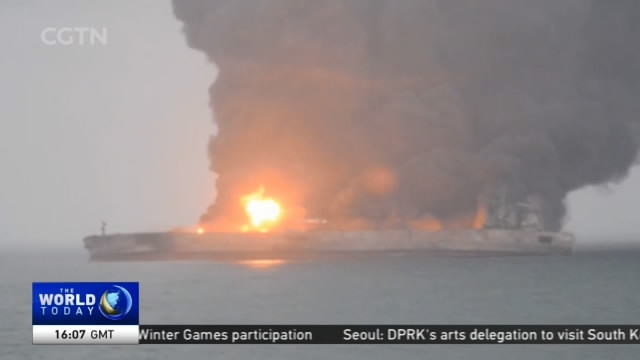
08:52, 21-Jan-2018
Sanchi Tanker Collision: Overview of China's efforts to salvage Iranian oil vessel

The Iranian oil tanker was carrying nearly 140 thousand tonnes of dangerous oil – better known as condensate -- when it sank around 300 nautical miles from the eastern Chinese city of Shanghai. China made an all-out effort to save the crew on the tanker and put out the fire. The rescue crews recovered two bodies and the ship's black box. Our reporter Li Jianhua covered the incident in Shanghai for CGTN. He now brings us the inside story of the disaster.
Flames everywhere, the Iranian oil tanker Sanchi turned into an inferno after colliding with a Hong Kong bulk freighter two weeks ago.
Right after the collision was reported, China dispatched 12 ships to the scene, including salvaging and law-enforcement vessels.
The fire was fierce and explosions could be heard from far away.
XU WEIGUO, CAPTAIN EAST CHINA SEA RESCUE BOAT 101 "We could smell the pungent odour when we were tens of nautical miles from the site. When we arrived at the scene, the fire was illuminating the sky. The merchant ships around didn't know what was happening, and kept asking us about the oil tanker. Then we commanded them to join in the rescue work."
The rescue operation was rather difficult and life threatening. The billowing smoke contained high levels of the toxic substance hydrogen sulphide.
ZHU SHENGFENG OIL SPILL EMERGENCY EXPERT "The combustion of condensate in such a short time might lead to the boat exploding suddenly. Incomplete burning of condensate would release high levels of hydrogen sulphide. This posed a great difficulty to our rescue work. What's worse, the rescue team could lose their lives anytime in the operation."
Up until last weekend, the weather conditions in the area were rather tough. The wind scale was from six to eight, which means the sea waves could reach three to five meters, equivalent to a two-storey building.
To help deal with such difficult conditions, more ships joined in the rescue work - including vessels from nearby provinces. The area covered in the search for survivors reached nearly 9,000 square kilometers. Meanwhile, the flames onboard showed no sign of dying down.
JIANG WENHUI, DIRECTOR EAST CHINA SEA RESCUE BUREAU "We had been working out ways to put out the fire, including how to (make use of the wind) to smother the fire with retardant foam. This has been the toughest job I've ever encountered in my 26-year-long career."
ZHU SHENGFENG OIL SPILL EMERGENCY EXPERT "We could only retardant foam or carbon dioxide to smother the fire, because of the nature of the oil on fire. The oil tanker was carrying thousands of tonnes of condensate, and we were running out of foam. And there was no way for us to cap it with any equipment on the sea. So it was nearly impossible to put out the fire."
One day before the Iranian oil tanker exploded and sank, four Chinese rescuers risked their lives to board it despite the roaring flames.
It was a life or death mission. Before they boarded, this picture was taken as none of them were sure if they would return alive.
XU ZHENTAO RESCUER WHO BOARDED BURNING SANCHI "The scenario was the worst I'd ever seen. The moment we approached the tanker, the heat of the blaze and strong smell of the smoke triggered my sensor. I immediately turned on my oxygen carrier."
They spent 26 minutes on the ship and managed to find the black box and two bodies of the crew. But the temperature - which hit nearly 90 degrees Celsius - prevented them from getting into the cabin.
XU JUNLIN RESCUER WHO BOARDED BURNING SANCHI "We were planning to wear anti-chemical suits, but it would restrict our movement and make it harder for us to enter the cabin. So we decided last minute just to wear ordinary suits."
XU ZHENTAO RESCUER WHO BOARDED BURNING SANCHI "And we only had limited time, because our oxygen could only sustain us for 40 minutes."
To facilitate Iran's rescue work in the Chinese waters, the Chinese embassy in Iran also issued visas to Iranian rescue teams and experts. And China's efforts have won the credit from Iranian officials.
ALI RABIE IRAN'S LABOR AND SOCIAL WELFARE MINISTER "Some are saying Chinese are only concerned about its environment instead of the lives of the crew on the Iranian oil tanker, but I don't see any single Chinese official saying so, and during my time in the country, seeing what they have been doing, I don't think Chinese people don't care about the lives of the crew."
Despite all the combined efforts, 29 of the 32 crew members still remain unaccounted for.
LI JIANHUA SHANGHAI "Earlier, I was here, ready to board a rescue ship bound for the spot where the oil tanker was burning. But half an hour after we got on the ship, we were told the oil tanker had sunk. The Shanghai Maritime Bureau said that now all efforts will focus on cleaning up the polluted waters. The Sanchi's long term environmental toll remains to be seen. LJH, CGTN, Shanghai."

SITEMAP
Copyright © 2018 CGTN. Beijing ICP prepared NO.16065310-3
Copyright © 2018 CGTN. Beijing ICP prepared NO.16065310-3